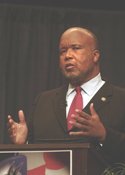U.S. Rep. Bennie Thompson, a Democrat from Mississippi's Second Congressional District, urged local governments to increase contracts with minority businesses during the Mississippi Economic Recovery and Procurement Summit this morning.
"There's always this notion that somehow minorities and small businesses don't meet the task. That's not true, but nonetheless, (the opinion) is still out there. If you give minority businesses an opportunity, you'll be pleasantly surprised. We have a number of very qualified small businesses that only need a chance to show their ability," Thompson said.
The congressman was a speaker at this morning's summit at the Jackson Convention Complex, along with U.S. Housing and Urban Development Deputy Secretary Ron Sims. Thompson. Sims joined Minority Business Development Agency National Director David Hinson and U.S. Department of Housing and Urban Development Assistant Secretary John Trasvina in encouraging small and minority-owned businesses to learn about new business opportunities resulting from the American Recovery and Reinvestment Act of 2009.
The event included a HUD training session and a "Business to Business Matchmaking" session featuring officials from the Mississippi Development Authority, the city of Jackson, as well as federal agencies, including the General Services Administration.
Thompson said the government's investment in minority and small business contracts generated considerably more local stimulus than contracts hiring out-of-state large businesses.
"Most minority contractors hire minorities, who tend to be the highest unemployed in the area, but they also tend to live in that area. So if you're looking to lower the unemployment roll in any community, the best way to do that is to hire a minority contractor," Thompson told reporters after his address. "Those individuals will invest probably 100 percent of that money they make as minority contractors back into the community. When you get the turn on that money, all of the businesses--the grocery stores and other businesses--profit from that, too."
Thompson said the federal government historically faced incidents of prime contractors lying about minority sub-contractor participation in their bid submissions to get a government-financed construction contract.
"How many of you have given a prime contractor your number (for contract work) and all the sudden you see work going up and your phone hasn't rung at all. Some of you have seen all the tricks. Sometimes (prime contractors) go out and hire their employees and call them a company, or the owner lists (his) wife as an owner and makes it a minority-owned company. We've seen all the hocus-pocus going on all these years," Thompson said. "We're looking for legitimate small and minority-owned businesses this time."
Sims said the Obama administration was pushing hard for genuine minority inclusion.
"We want to see jobs created. We want to see people hired locally and money spent locally," Sims said. "There are people outside this room right now matching opportunities to businesses. We've been doing that in Philadelphia, Chicago and here."
Thompson added, however, that sometimes the federal agenda does not trickle down as easily to the local level.
"[W]e need state and local officials supporting that effort, and part of the challenge is to get people elected to those positions who are comfortable advocating for small and minority businesses," Thompson said.


